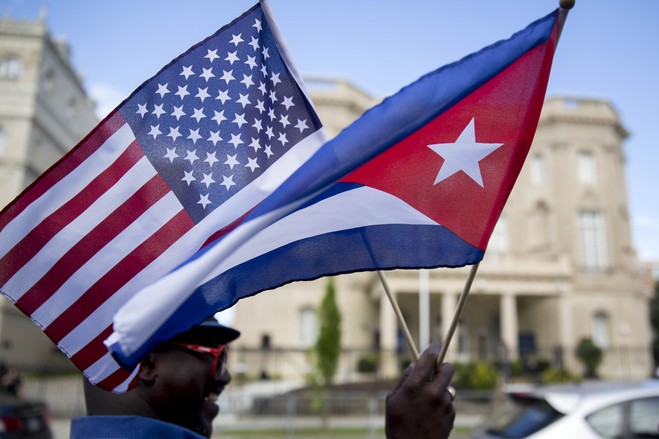by Eva Versteeg
After a freeze of diplomatic relations that spanned for more than fifty years, the Cuban and American governments have finally reckindled. Last August, government officials from both countries gathered in Havana, Cuba for a ceremonial raising of the flag. The ceremony marked the reopening of the U.S. embassy in Cuba, which had been out of use since 1961 when US president John F. Kennedy imposed an economic embargo. The half-century of icy relations between the two nations has been known for many tense situations, including multiple American attempts to assassinate former Cuban president Fidel Castro and the Cuban missile crisis during the Cold War. What happened between then and now? And what will follow the newly established bond?
Originally, the U.S. government put the embargo into place to weaken Fidel Castro’s Communist revolutionary government, which did not comply with U.S. politics standards. The intent of this measure was to get the Cuban people to overthrow Castro’s government, as Cuba’s economic dependence on the United States would make living conditions unbearable. However, the plan failed, Cuba’s and the United States government continued to be hostile towards each other. American travelers were no longer allowed to enter Cuba and trade between the two nations came to a complete standstill. Fidel Castro generally sided with the Soviet Union. The relations between Cuba and the USSR were established in 1959, when Fidel Castro came to power. Thus, when Kennedy put the embargo into place in 1961, the Cuban economy became largely dependent on the Soviet Union. The absolute highpoint of tensions – the Cuban Missile Crisis – between the U.S. and Cuba was therefore, unsurprisingly, Cuba’s decision to collaborate with the USSR and store their nuclear missiles as a response to American threats and storages in Europe.
Even after the fall of the Soviet Union by the end of the Cold War, relations between Cuba and the States were rocky. Between 1989 and now, the world witnessed tightened embargos, a large stream of Cuban refugees arriving in the U.S., Cuban spies discovered, but most importantly the end of Fidel Castro’s presidency and the adoption of power by his brother Raúl.
This rekindling of relations, which was agreed upon in late 2014, occurred for different reasons. Cuba is in dire need of economic improvement and the lifting of the American embargo would be one enormous step towards less complicated relations. The United States are hoping that this strategical decision will put their country in a good light to improve Latin American foreign relations in general.
But there is still a long road to walk. Due to strong ideological differences, Cuba and the United States will most likely encounter more difficulties. This was visible at the diplomatic opening of the embassy last August. During his speech, Secretary of State John Kerry stated that the United States “remain convinced that the people of Cuba would be best served by a genuine democracy.” Of course, these fundamentally different ideologies are hard to scoot aside. However, a first step towards a functional partnership is made.
It is now up to the future: will poverty in Cuba indeed decrease? According to the UN General Assembly, Amnesty International, Human Rights Watch and many other institutions, the U.S. embargo has always been unnecessary and harmful to Cuban citizens. The embargo will only be lifted completely once Congress votes in favor. This is not expected to happen soon, as many members of Congress will only do so if Cuba becomes a democracy. Until then, economic rules have been loosened and minor business transactions between Cuba and the United States are now possible. Additionally, U.S. citizens are now allowed to travel to Cuba, granted that their motive is ‘cultural enrichment’, straightforward tourism is still not allowed. It seems that the road ahead is going to be long and rocky, and it will take years before we will see the American McDonald’s culture invading Cuba’s authenticity. But as always, you have to start somewhere.
Eva Versteeg, Class of 2017, is a Religion, Philosophy and Anthropology major from Nijkerkerveen, the Netherlands.

